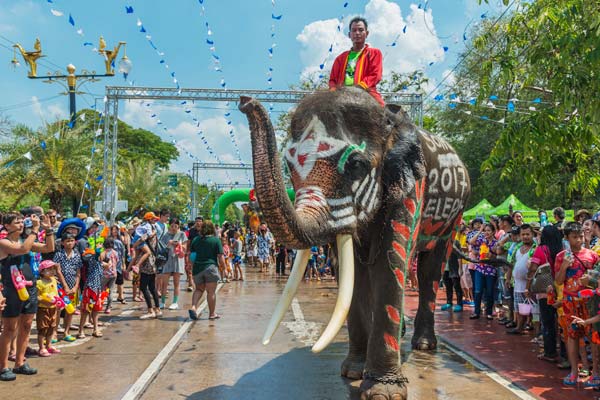About Songkran Festival that Soaks Up Thailand Annually in Water
For the Thai people, Songkran festival is synonymous with fun and celebration. It is one of the national festivals of Thailand celebrated from April 13 to 15th every year. Songkran is also dubbed as the water festival of Thailand because of the water fights taken place in every nook and corner of the country for fun and folly.
Songkran festival is perhaps the most important festival of Thailand since it marks the commencement of the summer season. It is actually the Thai New Year festival and was the actual New Year commencement day until over a century ago in Thailand. After declaring January 1st as the official New Year day for Thailand, the government declared the former New Year day of Songkran as a national holiday.

Origin of Songkran Festival
There is a beautiful Thai Buddhist myth behind Songkran which deals with a God’s lost bet with a human. A clever boy named Dhammapala was challenged by the Thai God Kapila Brahma. A riddle was put forward by the God, which was in case not solved by the boy, the latter would be beheaded, and if it was answered, the God should decapitate himself as he lost the bet.
The riddle was, ‘where does the glory of the man lie in the morning, in the noon and in the evening?’
The boy was so clever that he understood even the language of birds. He overheard the answer to the riddle from a chit chat between two eagles. The answer to the riddle was “the glory of the man is on his face in the morning, as he washes his face every day; it will be at his chest in the noontime where the man applies fragrance every noon; and the glory will be at his feet in the evening, so man washes his feet’.
The boy won the riddle, and thus the God’s head had to be chopped off. But, none of the earth, the sea and the air was willing to accept the God’s head, since doing so would have caused calamities in the world. So, the seven daughters of the God took the head on a platter to Mount Kailash as in a procession while taking turns to carry the platter. It is told that every gods and angels of the world were present to watch this procession. Later, the seven daughters began to assemble at the Mount Kailash every year to commemorate the event the same day and thus it emerged as an annual festival.
Another tradition links Songkran to Makar Sankranti, the Indian Hindu festival. As per this tradition, Songkran falls on the day which marks the entry of the sun into the Aries Zodiac and thus is connected to the solar cycle. The name Songkran has emerged from the Sanskrit word Sankranti, which literally means 'passage of the sun from one zodiac to the other’.
Songkran Festival Traditions
Though Songkran celebrations last for three days, beginning on April 13th, and ending on April 15th, Thailand usually falls in a festive mood the entire week. April 13th, the first day of the festival is called ‘Wan Sungkharn Long’ or ‘Maha Songkran’, which is the day that coincides with the transition of the sun from Pisces to Aries. On this day, the houses in Thailand are neatly cleaned and finely decorated. April 14th is the second day of Songkran festival, which is called Wan Nao in traditional Thai. Wan Nao is the transition day of the past year to the New Year, which is celebrated by the Thais as New Year’s Eve. Food is prepared abundantly at homes on the Wan Nao. On the same day, Buddhist monks go to temples and they build ritualistic sand pagodas called chedis.
The third day of Songkran is the Thai New Year, which is called ‘Wan Payawan’. On this day, people visit Buddhist temples and offer food to monks, and pay respect to elders. The monks are treated with respect in Buddhist culture. So they are given food and clothing by the devotees. Bathing the Buddha image with jasmine-scented water is another ritual during this day, as people believe it would bring good luck.
Songkran Water Fights
Whatever be the traditions and rituals, Songkran gets its global fame because of the countrywide water splash fights which are taken part by everyone in the country. It is a good watch to see the tourists also getting into fun and frolic filled water fights along with locals.
The tradition of water sprinkling might have started as a silent affair when devotees used to bath Buddha idols with jasmine scented water in order to purify themselves from past sins and bring good luck. Also, traditionally, young people used to spray fragrant water on their elders as a sign of respect.
This peaceful ritual gradually developed into more engaging and entertaining water fights that engulf the whole of Thailand in water during the festival season. As the festival takes place in April, one of the hottest months, it is natural to assume that people might have gradually begun to resort on more vibrant water splashing activities over the years to get relief from the warm temperature. There will be well-organized water splash events in all cities including Phuket, Bangkok, Chiang Mai, Pattaya, etc to name a few.
Songkran Special Food
Songkran festival is remarkable for traditional Thai food dishes which often have names that might sound like something signifying good fortune, or wealth. A Thai chicken salad, named Larb Gai, which means good luck in the Thai language, is an example of this. Also, Toong Tong (which means Thai money bag) is a delicious dish of deep-fried meat dumplings.
<p >Thai special dishes like Pad Thai, Tom Yum Soup, Thai Green curry, etc take the centre stage of Songkran dinner table. Some other dishes which are popular during the Songkran festival include pineapple fried rice, stir-fried minced pork, mango sticky-rice puddings, Crispy sweet chilli spring rolls, Massaman stir fry dish with beef and potato, Thai red curry with salmon fish, and so on.





